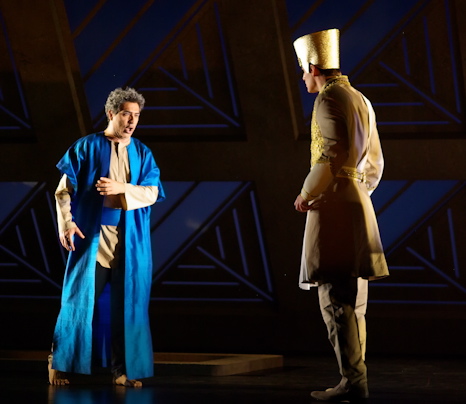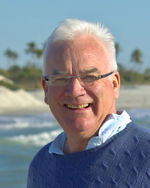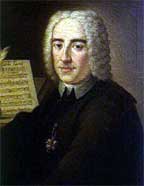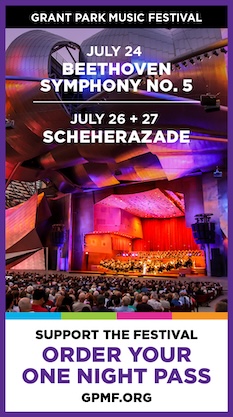Back to the future with Rossini’s “Moses” kicking off Chicago Opera Theater season

Business as usual for Chicago Opera Theater means taking chances, and the company’s 2010 season, which opens Saturday night and runs through May 16 at the Harris Theater in Millennium Park, is hardly playing it safe.
There are two household names: popular American mezzo-soprano Frederica von Stade and Rossini, composer of such zesty comedies as The Barber of Seville. But COT’s Rossini opera is the unfamiliar Moses in Egypt, last heard in Chicago in 1863. And von Stade stars in Three Decembers, a 2007 work by American composer Jake Heggie that is receiving its local premiere. The third opera in COT’s 2010 season is Giasone by Francesco Cavalli, a comic, bawdy look at Jason and his Argonauts composed in 1649.
Not exactly a season anchored by a surefire audience favorite.
Brian Dickie, COT’s general director, begs to differ. “We’re got three blockbusters,’’ he insists.
Moses in Egypt is one of Rossini’s rare, serious operas, a list that includes Semiramide and Tancredi, last seen at Lyric Opera in 1971 and 1989 respectively. Those were done, Dickie pointed out, “when Marilyn Horne [the American mezzo-soprano who helped spark a revival of relatively unknown 18th and early 19th century operas] was in her prime.
“Rossini is known for his comedies,’’ Dickie said, “but this is a marvelous piece, and there’s the new critical edition [overseen by University of Chicago musicologist Philip Gossett] that we’re using. On opening night, in 1819, they executed the parting of the Red Sea so poorly that it did turn into a comedy,’’ he joked, “but we’re hoping that that will not happen on this occasion. Musically, it’s instantly recognizable Rossini. There’s quite a lot of florid stuff, as you might expect.”
Von Stade—beloved by Chicago audiences for her feisty Rosina in The Barber of Seville–is planning to retire,, and Three Decembers, which is based on a play by Terrence McNally, will be her final Chicago appearances in staged opera. (This summer she will participate in two concert performances of Mozart’s Cosi fan tutte at the Ravinia Festival.) Von Stade, with Heggie at the piano, also will give a recital sponsored by COT on May 10.
But the season’s greatest novelty, and perhaps, indeed, truly a blockbuster, is Giasone. Cavalli was born in 1602 and, as a young man, worked with Monteverdi in Venice. His comic tale of a bed-hopping Jason has the same kind of austerely elegant, seamless melodies that COT audiences loved in the company’s riveting productions of Monteverdi’s Orfeo, L’incoronazione di Poppea and Il riturno d’Ulisse in patria.
Since Dickie arrived at COT in 1999, the company has made exhilarating forays into Baroque opera. Productions have been inventively staged, and the casts always include attractive young singers with fresh, vibrant voices. It’s only natural that the company should be bringing Chicago the latest hot new thing on the Baroque opera front.
After generations of neglect, Baroque opera began showing signs of new life in the 1970s. Singers such as Marilyn Horne championed rarely performed operas by Handel. In the 1980s, effervescent performances by William Christie’s ensemble, Les Arts Florissants, sparked a revival of interest in French Baroque. Monteverdi’s three surviving operas, written between 1607 and 1642, have become virtually standard repertoire for small opera companies.
And now Cavalli–phenomenally popular in the first half of the 1600s–seems to be having his day. The process has been slowly picking up steam. Britain’s Glyndebourne Festival, where Dickie made his career between 1962 and 1988, first presented Cavalli operas in the 1960s. Jane Glover, music director of Music of the Baroque, focused on 17th Venetian opera for her doctoral dissertation at Oxford and published a book on Cavalli in 1978. She has conducted numerous Cavalli operas, including productions at the Glimmerglass Opera Company in New York and the Aspen Festival. In May she leads a performance of Giasone in London where she is artistic director of Opera at the Royal Academy of Music.
“Giasone was the most performed opera in Venice in the 17th century,” said Dickie. “It was hugely popular, and it’s almost a Venetian opera equivalent of French farce. There’s a lot of mistaken identity and people hopping in and out of bed with different people.”
Giasone may resemble a French farce, but Justin Way, the Australian director who is supervising COT’s production, sees traces of present-day Las Vegas in Cavalli’s Venice. When Monteverdi’s Orfeo had its premiere in 1607, opera was an entertainment commissioned by noble families for their private entertainment. In 1637 a two savvy Venetians decided to try something “daringly novel,’’ as one commentator puts it. They opened an opera house and sold tickets to anybody willing to pay. The concept took off, and soon other opera houses were competing for the ducats of free-spending locals and visitors.
“Giasone was written,’’ said Way, “for a group of people who have turned up to the world’s most international city for its gambling, its brothels, its opera houses, its mix of other cultures. People are coming to the city to see what this thing called opera is.
”You’re in a public opera house for the first time,” said Way, “and most of the audience are young noblemen. Here’s a piece that ought to deal with the story of a noble man [Jason] who is on a noble quest. But actually he’s been totally waylaid by the pleasures that have been thrown in front of him.”
The opera, whose characters include Apollo, Cupid, Hercules and Medea, a mistress of black magic enraged by Jason’s infidelity, was a huge hit. There are records of at least 50 different productions throughout Italy during Cavalli’s day. A savvy businessman as well as a gifted composer, he made a handsome living investing in opera house and writing new works for them.
Eventually, the good times stopped rolling. By the end of the 17th century the powerful Catholic cardinals in Rome became fed up with Venetian-style opera. They wrote new rules dictating how operas should be composed. The rules led to opera seria, said Way, with its elevated sentiments and noble characters.
“It was the mixture of high and low that they didn’t like,’’ said Way, “the bawdiness. This opera is about libertinism, free love, seeing no boundaries, living for the day. They cited Giasone as their example of the opera that is totally corrupt.”
Way directed a lively, inventive production of Mozart’s The Abduction from the Seraglio for COT, and he is moving Giasone to modern times. Tapping into another aspect of 17th century Venice, he is presenting Jason as a kind of James Bond figure.
Venice was “a place that’s famous for its espionage, that’s starting to decay politically,” said Way. What better locale for the story of a handsome, wily rogue on a deadly serious but often comedy-spiced mission?
Chicago’s Baroque Band period-instrument group will be in the Harris Theater pit.
Whether Giasone turns out to be yet another Baroque hit for COT remains to be seen. Like virtually all arts organizations, the company is feeling the pain of the economic downturn. Rather than its usual schedule of five performances per opera, the company is giving four performances each of Moses in Egypt, Giasone and Three Decembers.
But COT will continue to be the place to hear cutting-edge Baroque opera in Chicago. Giasone kicks off a three-season overview of the field. With Medea as a recurring character, the company will present Charpentier’s Médée in 2011 and Handel’s Teseo in 2012.
“People are always interested in finding new masters,’’ said Dickie.
Chicago Opera Theater opens its season 7:30 p.m. Saturday with Rossini’s Moses in Egypt. www.chicagooperatheater.org; 312-704-8414.
Posted in Uncategorized


